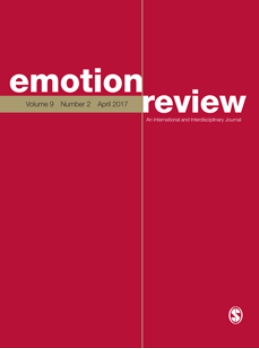为什么内部表征及其时间依赖性对情绪推理很重要
IF 3.4
2区 心理学
Q1 PSYCHOLOGY, MULTIDISCIPLINARY
引用次数: 0
摘要
对他人情绪的推断在很大程度上是从静态的线索呈现(例如,面部“表情”)中进行的判断,而忽略了时间动态和综合方面。在这里,我们扩展了预测处理账户的见解,重点关注时间依赖性的假设,以回顾当前的证据,并推进对情绪推理的语境和动态性质的研究。与建构主义的观点一致,我们的理论认为,人们通过绘制不同的表征来动态地形成他人情绪的模型,这些表征有助于不同的预测,并最终推断。我们回顾了内部表征在情绪推理中的作用以及情绪概念表征的可变性的证据,然后概述了预测处理帐户如何为有关情绪推理中的时间动态的新经验问题提供信息。本文章由计算机程序翻译,如有差异,请以英文原文为准。
Why Internal Representations and Their Temporal Dependence Matter for Emotion Inference
Inferences about others’ emotions have largely examined judgments from static presentation of cues (e.g., facial “expressions”), ignoring temporally dynamic and integrative aspects. Here, we extend insights from predictive processing accounts, focusing on the hypothesis of temporal dependence , to review the current evidence and advance the investigation of the contextual and dynamic nature of emotion inferences. Consistent with constructionist views, we theorize that people dynamically form models of others’ emotions by drawing on varied representations that contribute to divergent predictions and, ultimately, inferences. We review evidence for the role of internal representations in emotion inferences and for variability in conceptual representations of emotions then outline how predictive processing accounts can inform new empirical questions about the temporal dynamics in emotion inference.
求助全文
通过发布文献求助,成功后即可免费获取论文全文。
去求助
来源期刊

Emotion Review
PSYCHOLOGY, MULTIDISCIPLINARY-
CiteScore
6.60
自引率
3.70%
发文量
34
期刊介绍:
Emotion Review is a fully peer reviewed scholarly journal. It adheres to a blinded peer review process in which the reviewer"s name is routinely withheld from the author unless the reviewer requests a preference for their identity to be revealed. All manuscripts are reviewed initially by the Editors and only those papers that meet the scientific and editorial standards of the journal, and fit within the aims and scope of the journal, will be sent for outside review. Emotion Review will focus on ideas about emotion, with "emotion" broadly defined. The Review will publish articles presenting new theories, offering conceptual analyses, reviewing the literature, and debating and critiquing conceptual issues.
 求助内容:
求助内容: 应助结果提醒方式:
应助结果提醒方式:


